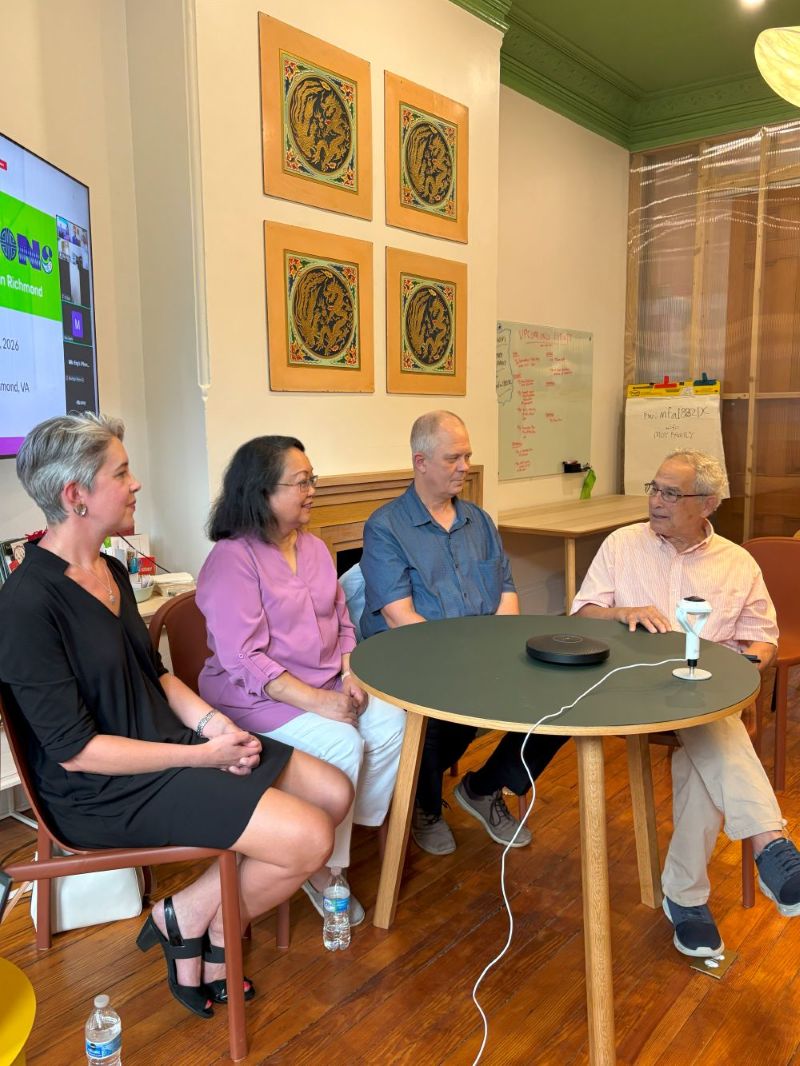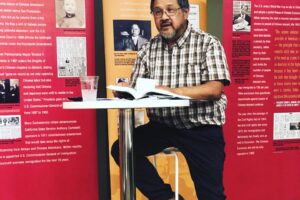On July 27, 2025, the 1882 Foundation hosted a “Talk Story” event at its Washington, D.C. office to discuss the curatorial process behind Generations: Stories of Asian Americans in Richmond, an exhibition that opened earlier that month at The Valentine museum in Richmond, Virginia. Approximately 20 people attended the exhibition’s opening reception online and in-person, reflecting strong community interest. The panel conversation featured Ting-Yi Oei (Education Director, 1882 Foundation), Meg Hughes (Director of Collections and Exhibitions, The Valentine), Rosario Igaras (Asian American Society of Central Virginia), and Dave Pearson (photographer for the exhibition). The panelists discussed how the exhibition was created collaboratively, without a traditional curator, and with heavy involvement from community members, making it both a grassroots and museum-level storytelling project.
The exhibit features 32 photographic portraits of Asian Americans in the Richmond area, each accompanied by a first-person narrative and a meaningful object representing family, heritage, or memory. Participants were recruited through community outreach efforts—particularly during the annual Asian American Celebration hosted by AASOCV—and were encouraged to share personal, multigenerational stories that might otherwise be overlooked. Objects featured in the portraits included a Korean hanbok gifted to a Korean American adoptee, a family calendar page marking a birth during the Chinese Communist takeover, and a chef’s cleaver used to represent culinary lineage and identity. Some portraits feature families spanning generations, while others portray individuals navigating personal journeys of cultural connection, migration, or belonging.
Pearson emphasized that although he was not traditionally a portrait photographer, his approach prioritized storytelling over formality, often working with participants to select meaningful settings and poses that reflected their lives. He described photo shoots as spontaneous and collaborative—often involving humor, creative location choices, and sensitivity to each subject’s comfort level. Hughes explained that the exhibit design intentionally allowed the portraits to speak to one another thematically, highlighting shared cultural objects like instruments, clothing, and heirlooms while revealing deeper patterns of adaptation, identity, and intergenerational memory.
The exhibition’s title, Generations, reflects both the presence of multiple age groups and the idea of cultural transmission over time. Stories of resilience, immigration, adaptation, and reclaiming identity echoed throughout the discussion. Rosario noted the significance of representing diverse national origins—including Filipino, Korean, Chinese, and Vietnamese Americans—and how the exhibition fostered pride, visibility, and emotional connection within the Richmond Asian American community. Panelists also discussed design elements, including a logo by Korean American designer Emily Park, and the inclusion of maps and data visualizations contextualizing demographic growth in Richmond’s Asian American population since 2000.
Looking ahead, the panelists expressed enthusiasm for the exhibition’s future. In addition to running at The Valentine through Memorial Day 2026, it will be transformed into a digital exhibition to broaden access and longevity. Plans are underway for related public programming focused on intergenerational storytelling, school visits, and potential future iterations of the exhibition in other cities. The event closed with a thoughtful Q&A session, during which audience members asked about multigenerational representation, favorite portraits, the photography selection process, and the potential for touring the exhibit beyond Richmond. Panelists emphasized that community storytelling is both a tool for belonging and a source of joy—and affirmed that Generations is ultimately an invitation to listen, reflect, and celebrate shared humanity.
Written by Sraavya Chintalapati, 2025 Summer Intern, University of Texas, Austin ’24


